Weekly Writing Summary For The Week Ending 2/29/2024
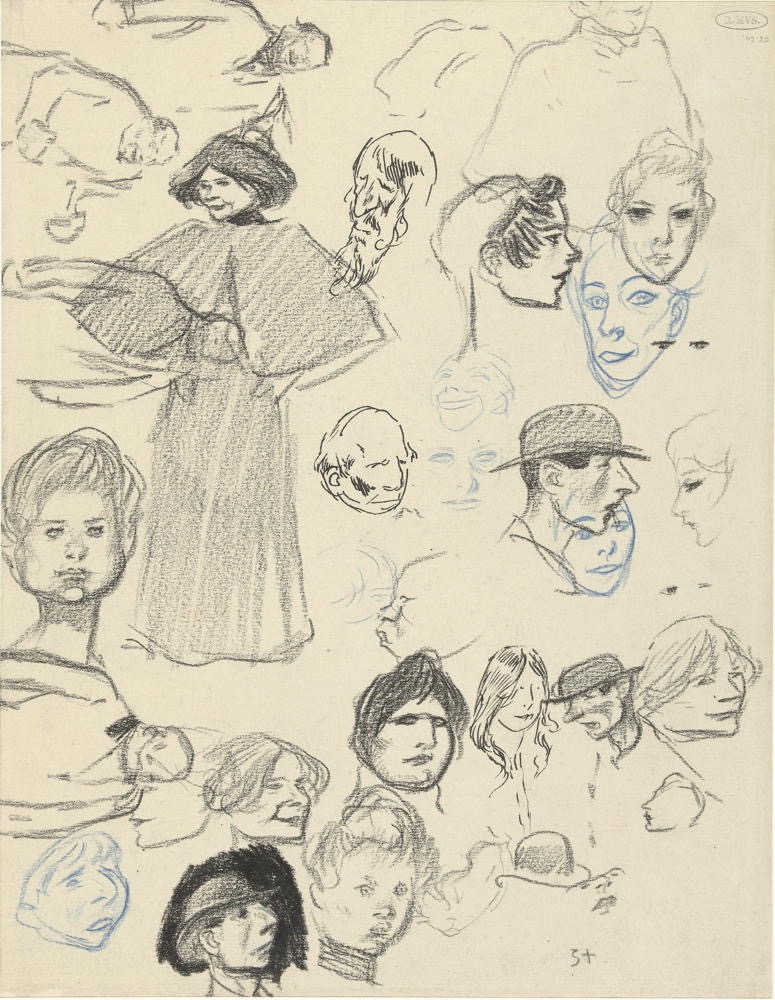
Théophile Alexandre Steinlen:
Diverse portret- en figuurstudies van vrouwen en mannen
(1869 - 1923)
Still Present From Our Own
The state of being gone has always fascinated me. In perhaps the most fundamental sense, no one can ever achieve goneness in their own presence. When I'm gone, I'm just absent from someplace in which I used to be present. I'm still present then but surrounded by perhaps less familiar territory. There's no place like home, but then there's no place very much like any other place. The Muse and I engage in our epic toodles not to escape but to delve more deeply. We seem to become closer and more interdependent when we're toodling, more patient and forgiving, and less distracted. We become precisely who we always were, only a little bit more so. Nothing's really very different except the scenery and the company. We remain intact. We receive daily reports on the state of the cats we left behind. They remind us we have a place to return to and people who notice we're missing. They're adapting as they always do—as we always do, too—and we'll require some reconnecting after we return from an absence we never entirely experienced for ourselves. We are absent from the cats' perspective while still present from our own.
Forested
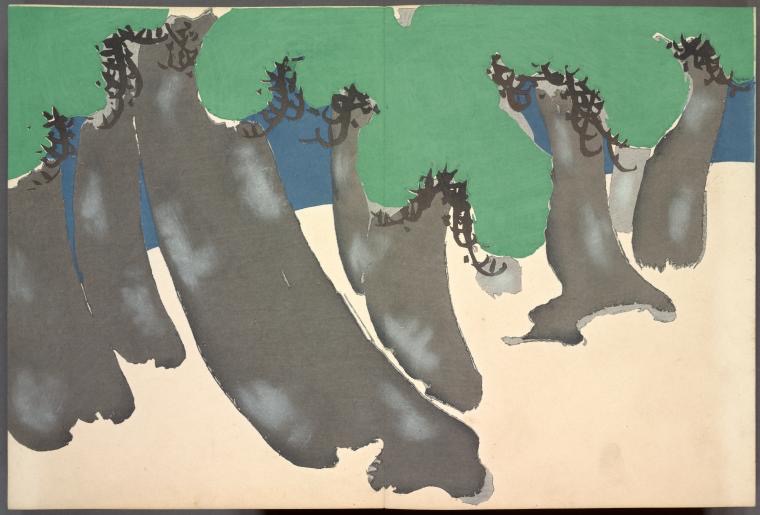
Kamisaka Sekka (神坂 雪佳: Forest (1909-10)
“I couldn't imagine.”
Contrary to popular mythology, little of the North American continent seems Forested. Yes, more of it once was than now remains, but even then, the bulk of this place was initially comprised of empty spaces. Anyone expecting to encounter forest primeval here must adjust their expectations or face severe disappointment. While histories might speak of vast arboreal Forests covering the original Eastern seaboard, a few centuries and a blight or two later have reduced what once seemed infinite into the essentially invisible. Great fires eliminated the once-great Northwoods. Lumbering humbled the once impenetrable Cascade and Sierra. We've successfully put nature in her place as a servant to humanity's desires, not that those have ever called upon terribly much humanity from man. We see nature as our resource to do with whatever we please, with remarkably predictable results.
A toodle across western lands mostly traverses what might appear to be wasteland.
TimeTraveling
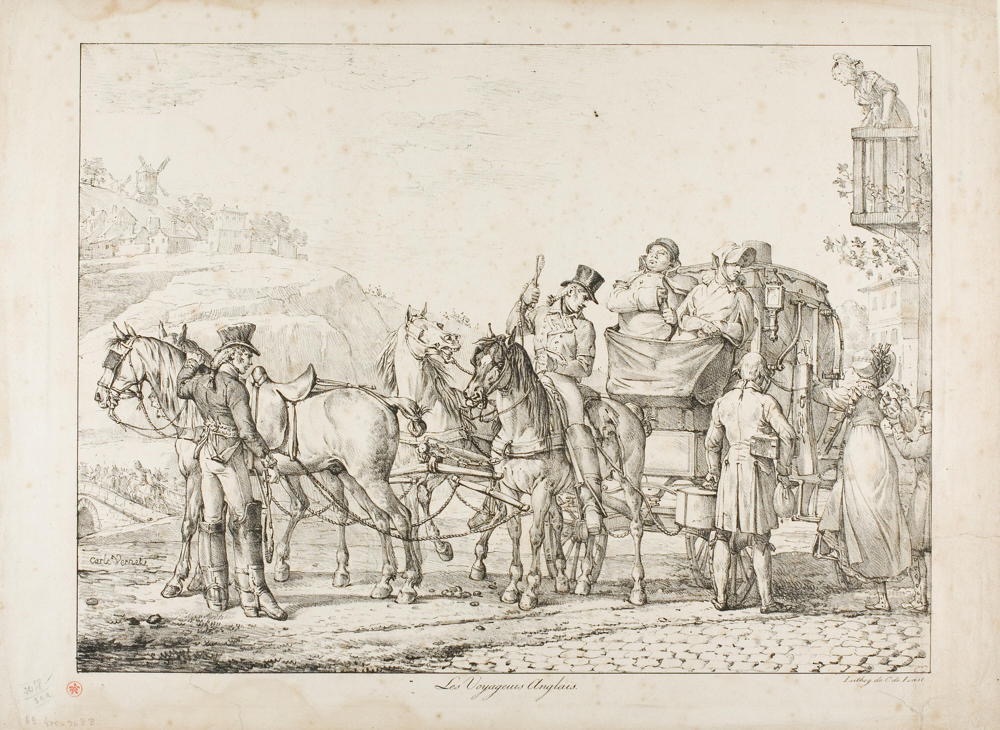
Carle Vernet: English Travellers (1815–25)
"I found a familiar sense of place …"
When toodling, The Muse and I are not merely traversing space but also TimeTraveling. All time seems present in The Schooner's cabin then, and even the territory we travel through seems unhinged and separate from the present. The ages of this world seem well-represented, from the earliest recorded activity to the present weather, all linked together. We do not seem just to inhabit the present, either. We're not just some audience passively watching a separate world pass, but an intricate part of those spaces and those times. Our conversation reflects this effect as it wanders through halls in its bathrobe, flitting from there and then to here and now, then forward to some future where and when. Our story's just as unhinged as our journey.
A stiff wind blowing sand met us as we entered The Mohave, and our stories shifted to that time when my birth family held up overnight behind a retaining wall behind a gas station there.
CaliforniaRules
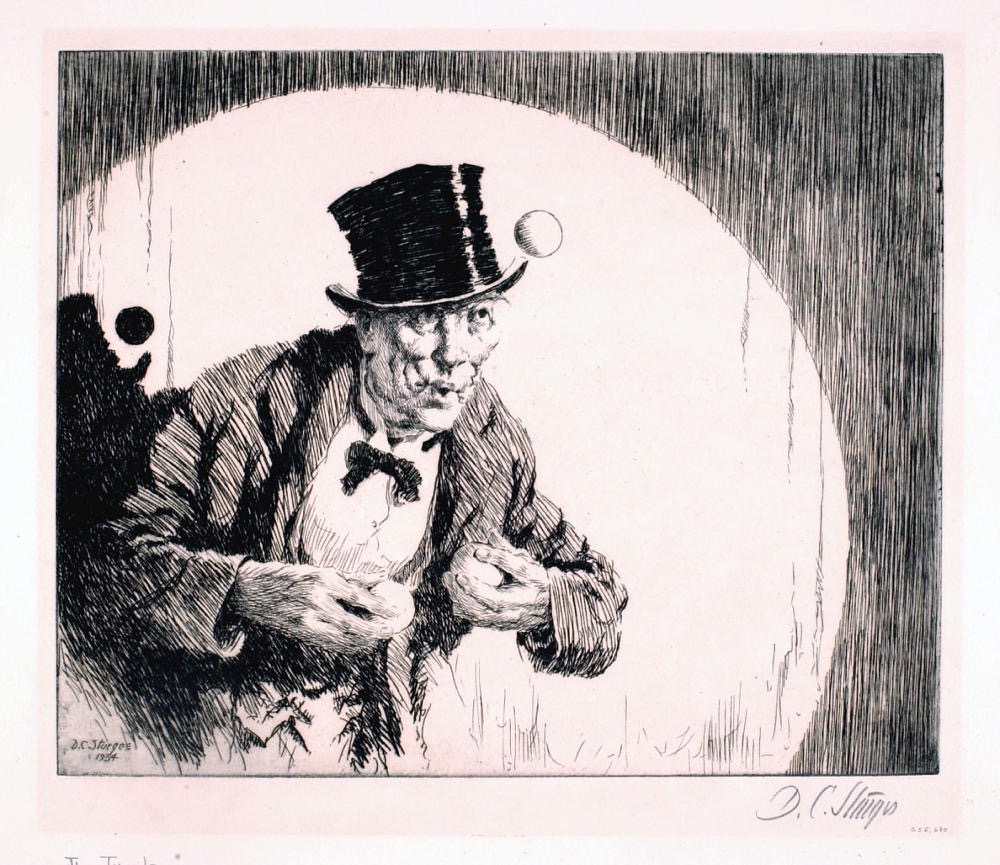
Dwight C. Sturges: The Juggler (1934)
"I'm not the one to point out ironies …"
Toodling demands a high degree of adaptability. Not that anybody should ever attempt to become a chameleon. One should properly acknowledge the differing and varying local customs without trying too terribly hard to fit in, for such adaptation tends to highlight just how one does not fit in, often annoying locals. I say the visitor should properly stay precisely who they always were while deferring to whatever occurs around them. For instance, I consider myself a highly disciplined driver, as exhibited by the fact that I rarely, if ever, exceed the posted speed limit. I consider it a matter of virtue and discipline that I observe this limit and a form of immaturity to disregard it. Certain alien cultures see their world differently. In California, for instance, driving discipline entails almost the opposite of my parochial custom. In CaliforniaRules, speed limits serve as the baseline from which all driving must occur. A speed limit there does not mean 'do not exceed' but 'must exceed,' for it serves as a terminal minimum. Regardless of the conditions, a Californian must drive faster than any posted limit.
They seem to drive like lemmings.
Finding
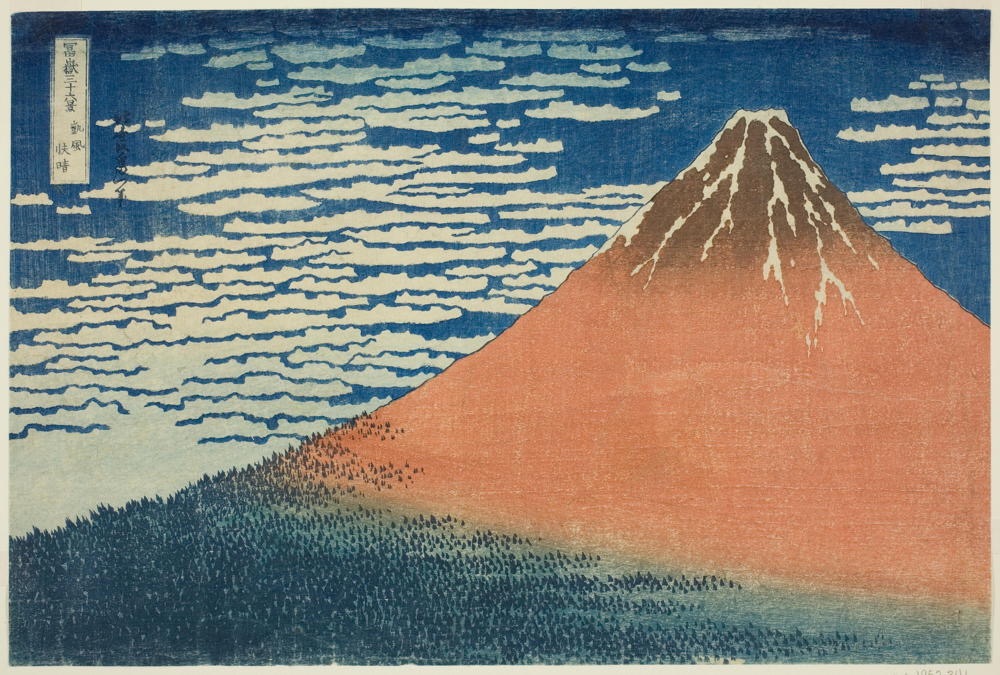
Katsushika Hokusai 葛飾 北斎:
A Mild Breeze on a Fine Day
(Gaifu kaisei),
from the series “Thirty-six Views of Mount Fuji
(Fugaku sanjurokkei)”
(c. 1830/33)
" … maybe those things just found us …"
Finding doesn't necessarily require seeking. When I put myself out there, I stumble across something serviceable if I pay at least a halfway kind of attention. Presence or any particular mindfulness need not precede discovery, either. It's mostly a matter of me just being there. My more noteworthy discoveries might find me, though they might not seek me or anybody. It might be that these adventures, these plots and twists, result from random interaction and that all our fervent instruction in the supposed fine arts of seeking amounts to little more than attractive distractions, useful for diversion and entertainment but useless for their stated or presumed purpose. I've usually found something other than advertised when I attended some workshop or training, whatever the intended purpose. So it always seems.
Toodles seem to bring out the best of this class of experience in us.
GreatBasin
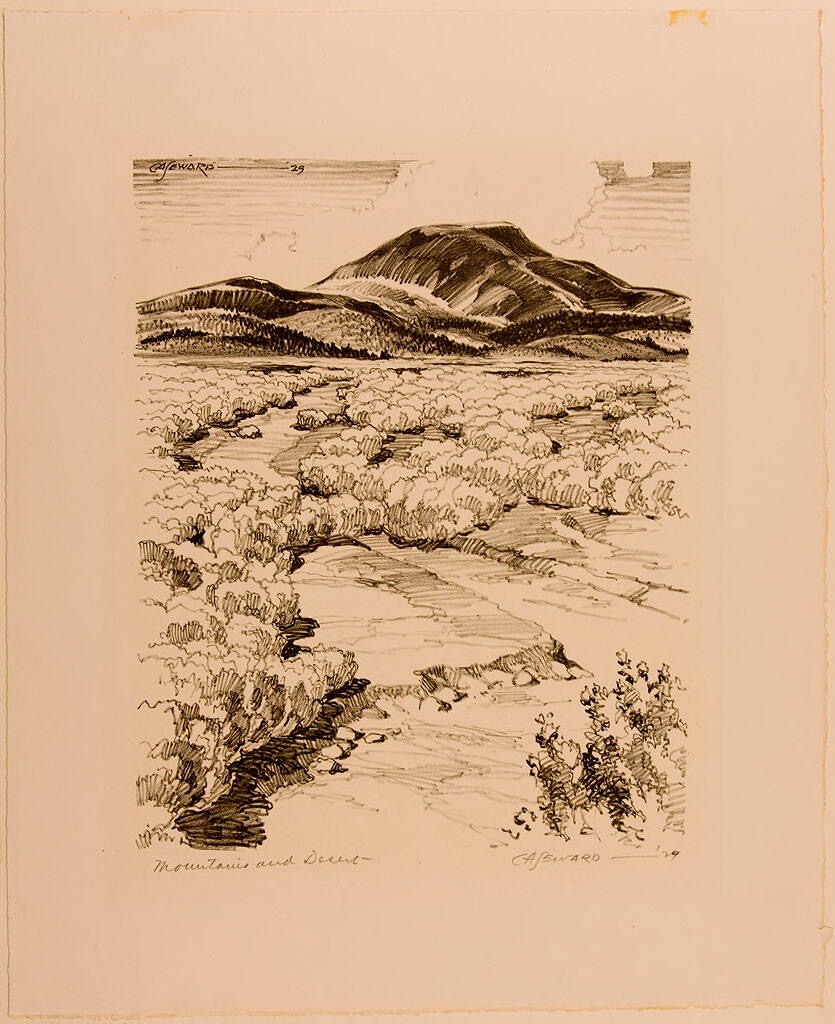
Coy Aron Seward: Mountains and Desert (1929)
"We'll be on to someplace different before then."
At first, The Muse didn't believe me when I told her we would be toodling through a part of the country where rivers don't drain to the sea. Vast areas of the inner mountain west feature no outlet to any ocean. Whatever moisture falls there either evaporates or easily slips into the thin rocky soil. Whatever runoff proves too voluminous accumulates into salt lakes or sinks where it becomes unusable for irrigation or potage. Seasonally, much of the landscape sees moisture, especially if the winter, like this one, proves snowy. In late Winter, just before Spring, the landscape seems remarkably well-watered. What looks like a greasewood desert might be slough, a few inches deep in slow water from upland snow melt. Sheep might graze there for a few weeks before being herded into the higher country to finish their season.
Our little dish bowl valley would be a basin were it not open to drainage.
Saidlines
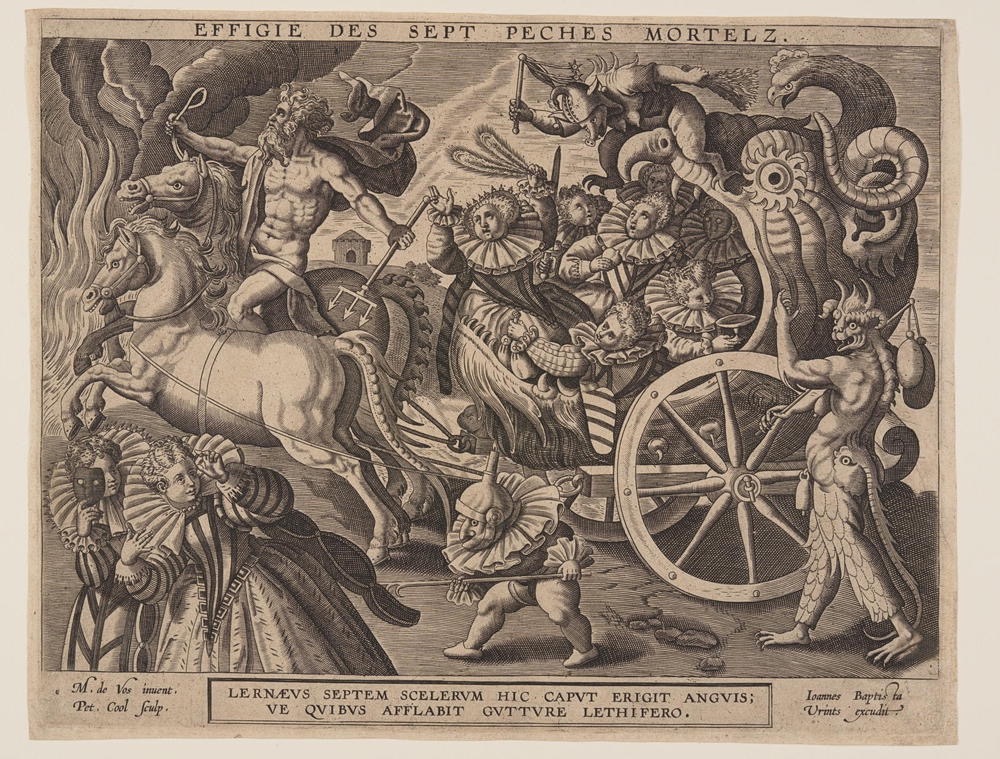
Pieter Cool: Chariot with the Seven Deadly Sins (c. 1590)
"Saidlines are not deadlines …"
The days leading up to any scheduled departure become increasingly challenging as the date approaches. My internal monologue escalates toward a frantic pitch as I enumerate fresh expectations to myself, setting Saidlines. I begin with a single relatively simple notion of something I should accomplish before allowing myself to leave, something like 'clean out the fridge,' always a good idea if I'll be absent for more than a week. If I could only leave my expectations there! I continue adding additional notions until I've amassed a burden no ten people could manage to accomplish before departing. I add these additional ones in innocence, for I don't tend to notice how onerous the list has become until after it's already overwhelmed me. Then, I'm negotiating from a position of little power or authority because that list has me by then. There's really only ever one way I will ever manage to exit and that's by deciding what I will leave undone.
I sense an underlying evolutionary imperative working here: I'm not just weird.
Weekly Writing Summary For The Week Ending 2/22/2024
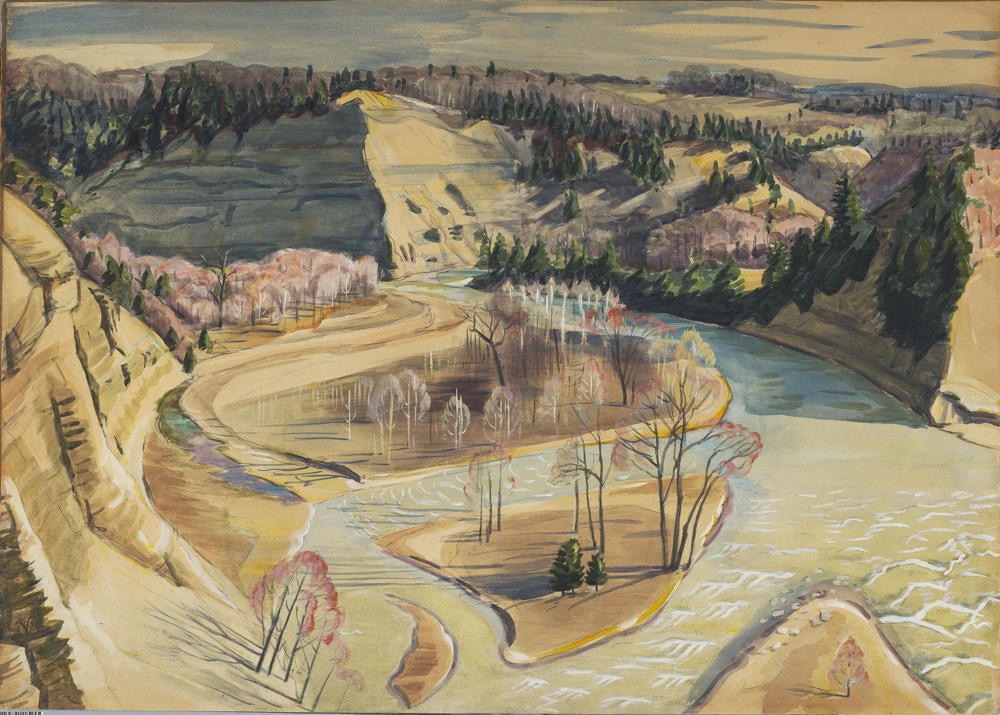
Charles E. Burchfield: March Sunlight (1926-1933)
I Hope To Never Fully Recover
The cost of travel these days seems to be the illness one experiences after an excursion. If we could just stay put, I imagine we might live forever, but we’re nosy by nature, and so feel we must go adventuring. While sightseeing, invisible forces stalk us. We should understand this by now, especially after That Damned Pandemic ravaged us. Those of us able to keep our heads down and huddle experienced significantly fewer ravages than those who weren’t. Travel now seems to broaden as well as flatten, the quality of these experiences filtered through the usual negative externalities. The day we decide just to stay safe might be the day we finally accept ambiance as our native state. If we weren’t supposed to change, we’d be more solid and much less fluid. If we weren’t supposed to get ill, we might never have to learn or unlearn anything we’d come to hold sacred, and none of us might ever experience the sublime sensation of getting Better or Well Again. I hope to never fully recover from this writing week’s realizations, even though I end the week two stories short. Thank you for following along!
Easing
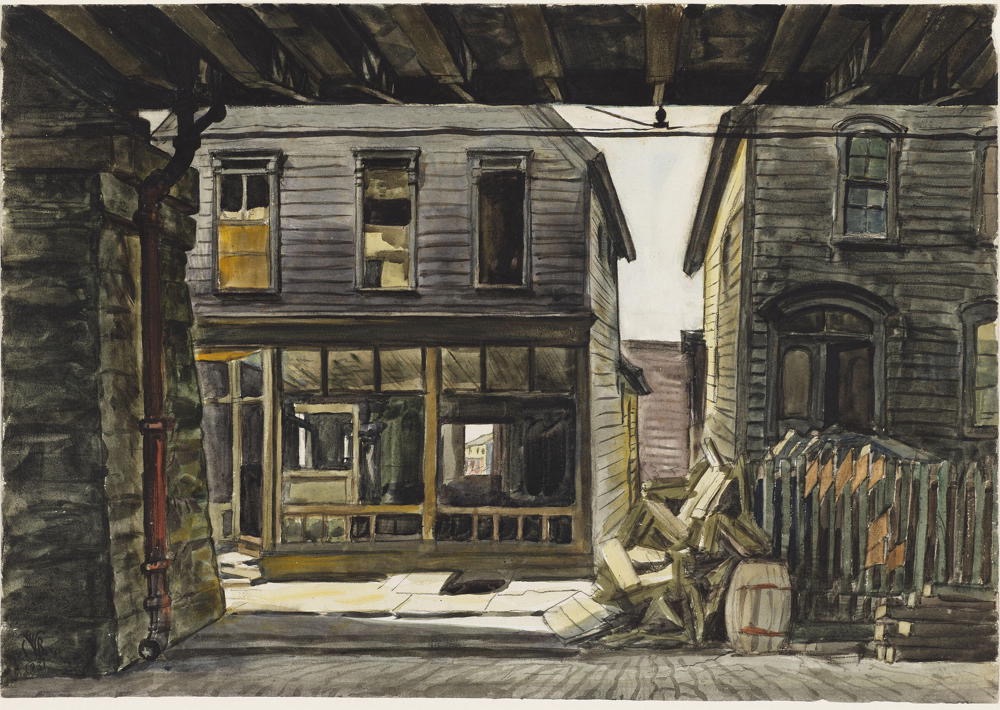
Charles E. Burchfield:
The Back Street [Two Houses under a Viaduct] (1931)
"It might be inhuman to learn this obvious lesson."
Language seems to be a means by which we represent by misrepresenting. There's nothing especially earthy about Earth. It's just a label, and dirt by any other name might smell every bit as musty. This can't become a problem as long as we hold the translation key. It becomes interesting when considering internal conversations where one encodes and decodes exclusively for oneself. We all employ little phrases to describe our experience to ourselves. These phrases are not necessarily meaningful to anyone else, but they only need to contain meaning for ourselves and nobody else. I continually characterize what I intend in ways that materially misrepresents my intention. I plan, for instance, to do things I should know I won't do in the way I describe them. I might insist that I'm going to jump right back into my everyday activities of daily living after laying low with a cold, though I might better describe what I'll do as Easing back into. I won't resume at cruising altitude or speed but will need some time to regain my previous momentum.
Two hours back into work after a few days of laying low, I felt as though I'd just swam a marathon.
WellAgain

Urs Graf: The Healing of the Man with Dropsy (1511-15)
"We could not have experienced healing had we not first caught that terrible cold."
It feels like a miracle occurred overnight. I wake refreshed for a change, perhaps for the first time. I'd forgotten the effortlessly breathing sensation of merely being without the burden of anything intruding. Molly, so recently still a feral cat, has taken to cuddling in close on these cold nights, creating a crease of warmth between her and The Muse's comforter-covered leg. She welcomes me now as I reach to stroke her reclining body, ears to tail in the predawn darkness. She purrs like the kitten I long ago predicted she would eventually become under my tireless tutelage. She might one day soon even consent to sit on my lap. Then, her transformation into a kitten will be completed, and contentment will reign. I fear that she will never again be capable of reverting into her feral self, which means that I might not need to be nearly so wary but also that she will have finally forfeited her birthright fierceness. However close we might seem in these early mornings, she will always remain a killer inside.
I wish the world peace this morning.
Better

Denman Waldo Ross:
Portrait of a Young Man (19th-20th century)
"Maybe by tomorrow …"
At best, Better seems to be an incremental element, difficult to assess. The Muse asks if I feel Better today, and the best I can muster in response tends to be a lackluster "Maybe." I must measure altogether too much to draw any more definitive conclusion. I definitely felt better a few moments ago, but then my nose started running again just after I'd considered that portion of the program finished. It's fits and starts with plenty of backsliding. At best, I might be easing into Better, but I have not quite arrived there yet. I've heard stories of some people with cold-like symptoms taking weeks to finally resolve their situations. What began as no more than a slightly annoying tickle in my throat seemed to take the long route through and back out of this host organism. It's been so long, with the Damned Pandemic and all, since I had a cold that I'd entirely forgotten what the experience entailed. They sure do seem to be long-tailed infections.
I seem to remember that the sneezing represents a virus' last attempt to survive.
Noisemaker
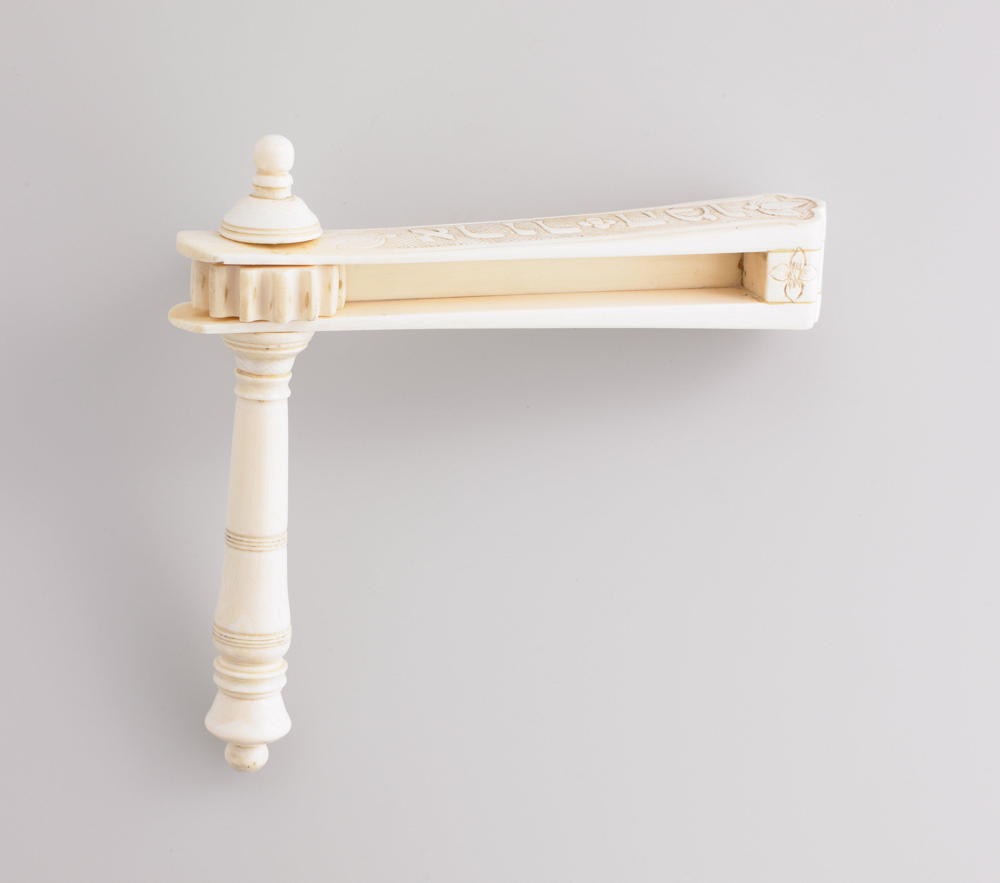
Unknown artist: Ivory Grogger (noise maker), Middle East or India, (20th century)
" … almost all the actual effort should seem lost in rounding."
A recent New Yorker article (The Next Scene by John Seabrook, February 5, 2024) reports on Sir Lucian Grainge, the chairman and CEO of Universal Music Group, the "largest music company in the world." In his decades in the music business, Grainge has survived many disruptions. He began his career in the LP era before facing the transition to CDs and then file sharing, each shift threatening to nudge him and his industry into oblivion. Now, AI looms. From a world where "labels were the only game in town" to one where platforms proliferate, … of the hundred and eighty-four million tracks available on streaming platforms, 86.2 percent received fewer than a thousand plays, and 24.8 percent—45.6 million tracks—had zero plays." Competing against a hundred and twenty thousand new tracks appearing online daily is tough.
Grainge dismissingly refers to most of this flood as "noise," and some of it certainly qualifies.
Weekly Writing Summary For The Week Ending 2/15/2024
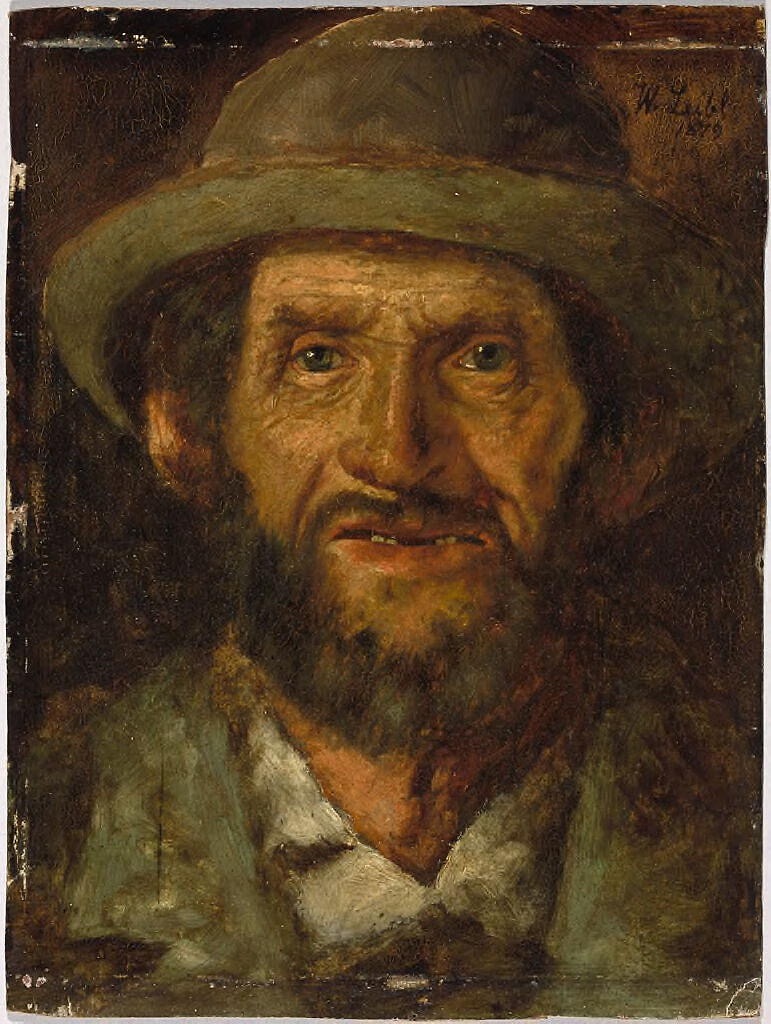
Attributed to Wilhelm Leibl: Head of a Man (1879)
There But For The Grace
It might be true that the best work emerges during breaks. Certainly, this principle serves as the centerpiece of OpenSpace meeting technology, that conversations in the hall will reliably prove superior to any more formally organized in scheduled sessions. For me, too, my writing seems to come to fruition more fluidly when I’m being a foreign correspondent, attempting to post from some primitive replacement for my usual office, chair, and window overlooking The Center of the Universe. I usually find some coffee shop corner where I can bum some internet and sip an Americano while composing my posting. In San Francisco, though, coffee shops no longer offer chairs to patrons. The tables remain, but the chairs are absent. I suspect they do this to keep the homeless from encamping there. I found that I couldn’t enter without offering to buy someone a cuppa and some breakfast. It’s small potatoes for me and more significant for the receiver. Decency demands this, with at least a small remembrance that There But For The Grace Go I. I’d slink back to the hotel and write in a shady corner off the lobby while listening to the city waking up around me. That fog-shrouded light remains incomparable.
Reprehensitive

Small Jade Sculpture Representing a Crab Grasping a Branch of Blossoming Chrysanthemum
(18th century-Qing dynasty, 1644-1911) East Asia, China
" … a future better informed if not necessarily better served …"
Following Donald Trump's election in the Fall of 2016, a small group of local progressives scheduled a time to show up at the downtown office of our United States Representative to discuss issues. They were welcomed by an admin who listened and commented, but they were denied access to their actual representative. They returned each Tuesday morning for many following months until, apparently begrudgingly, she finally deigned to offer them an audience. She invited a local conservative businessman to attend, perhaps to buffer her opposition's presence. She listened after a fashion, railed against regulations, and nothing happened. Over the following years, her presence continued to be scarce. She would conduct so-called town meetings with her constituents but only announce the meeting time and location to members of her party. She'd often visit this city without announcing her arrival, conduct business privately, and then disappear back to Spokane or Washington with her opposition none the wiser. In frustration, a group conducted a rally on the courthouse lawn with the theme, Where's Cathy? Bikers showed up to drown out the speakers.
She announced her retirement last week, and the local paper quoted prominent party members, citing her unwavering support for our region.
Candid-Ate
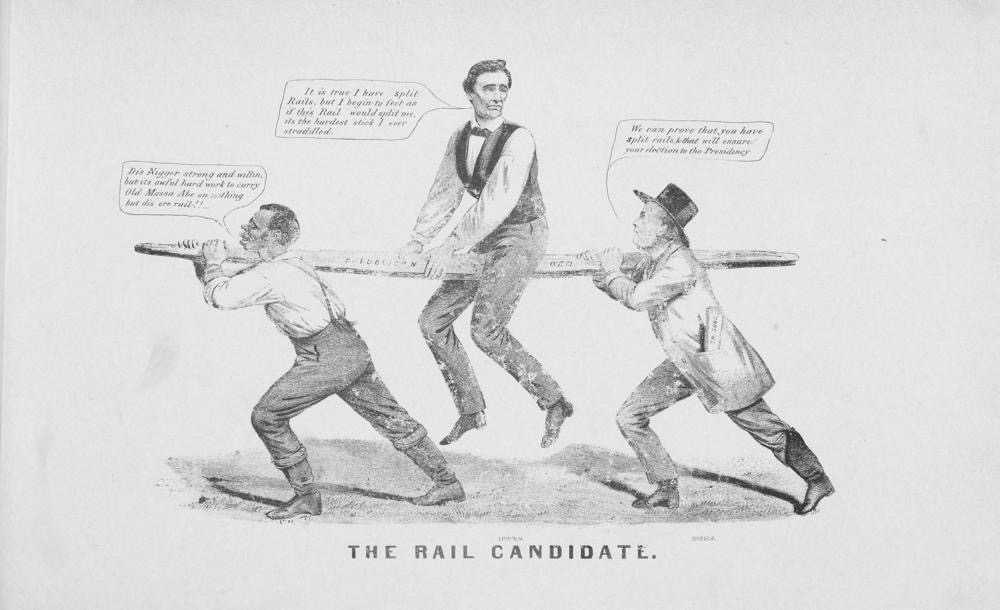
Unknown Artist: The Rail Candidate. (1918)
"Democracy is a form of governance utterly dependent upon such delusion."
During the presentation, I lean over to whisper into The Muse's ear, "It's rare to see a candidate simultaneously balance atop three third rails." The Candid-Ate, of course, seems oblivious. She appears to believe that her positions represent the very soul of reasonableness, and they might, within the narrow world she seems to have inhabited. We live on what must seem the fringes of her district. Her comparisons and even her metaphors employ characterizations that disclose that she doesn't know the perspectives of most of her electorate. It's okay; she's free to stand on anything during her candidacy, even abject public insanity. Lord knows the opposition often has and continues. She will be eaten alive by her competitors. I pray that her candidacy does not survive even until the primary. She's still too much the naive rookie to survive even a modestly better-informed challenge. She'll embarrass herself in anything like a public debate. She does exceptionally well in that department all by herself.
Candidacy seems like a simple extension of something most of us do.
EscapeArtist
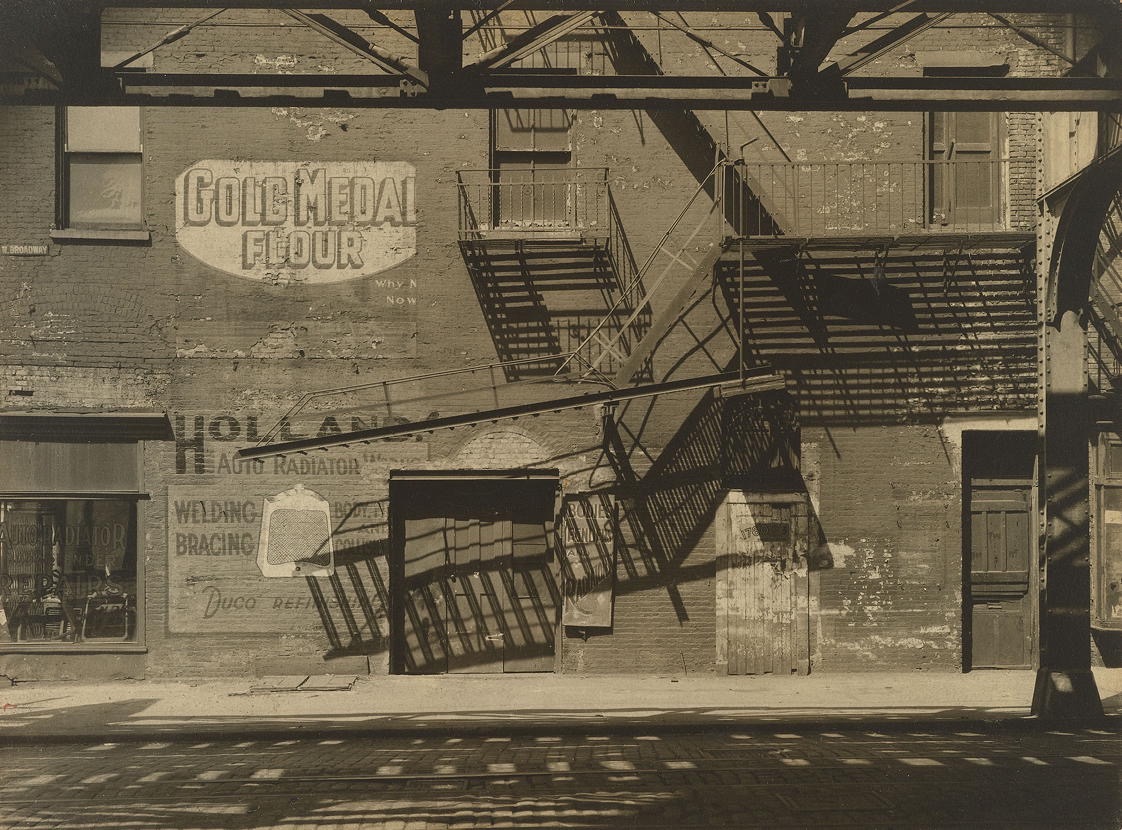
Peter Sekaer: Fire Escapes and Shadows (c. 1935 - 1938)
"I suppose I never had."
Our trip to San Francisco got my internal dialogue (iAlogue) generator humming. I remembered, fondly and otherwise, past lives, proximity reminding me with flashes of both brilliance and darkness. I can't help but conclude that I was probably clinically insane between the ages of forty and fifty, the period of my life when I set about to reinvent myself. Instead of ever getting away with anything, I became more emphatic examples of myself. Still, I managed to maintain a different enough lifestyle that even I struggled to describe what I was trying to achieve. I divorced and remarried twice. I created my seminal works and watched them struggle to gain acceptance. I'd escaped what I'd imagined as a great trap only to discover myself trapped at different logical levels. I might have enjoyed frequent-flier upgrades but lost the charm of unengaged Tuesday evenings. I became an EscapeArtist who ultimately never got away with anything.
I became familiar with a dozen different local rhythms, priding myself on my ability to find a decent bakery and acceptable coffee within about an hour of landing anywhere.
Looking

Jacob Cornelisz van Oostsanen (workshop of):
Portrait of Jacob Cornelisz van Oostsanen (c. 1533)
" … our faith in Spring, ourselves, and this universe renewed."
"You can see a lot by looking."
-Commonly attributed to Yogi Berra
A tradition was born on January 21, 1979, when a young family decided to take their ten-month-old son for a drive in the country. It was a Superbowl Sunday, a holiday for everybody except for this young family with a fussy baby. They found the roads down into the Willamette Valley remarkably empty. The typically cool and grey afternoon seemed distinctly more Spring-like than any they'd seen since their son was born. Over that year, they'd moved out of their final college apartment and into their first home, a genuine wreck of a place with potential. The husband and father had finally graduated from university, and with the addition of their delightful son, life seemed distinctly promising. About an hour into the toodle, they spotted a field filled with sheep and a few gamboling lambs. Nothing—and I mean nothing—better screams "Spring!" and hopefulness than a green field filled with gamboling lambs.
We took our son out of his car seat and stood transfixed beside that fenceline for the longest time.
SF_Oh
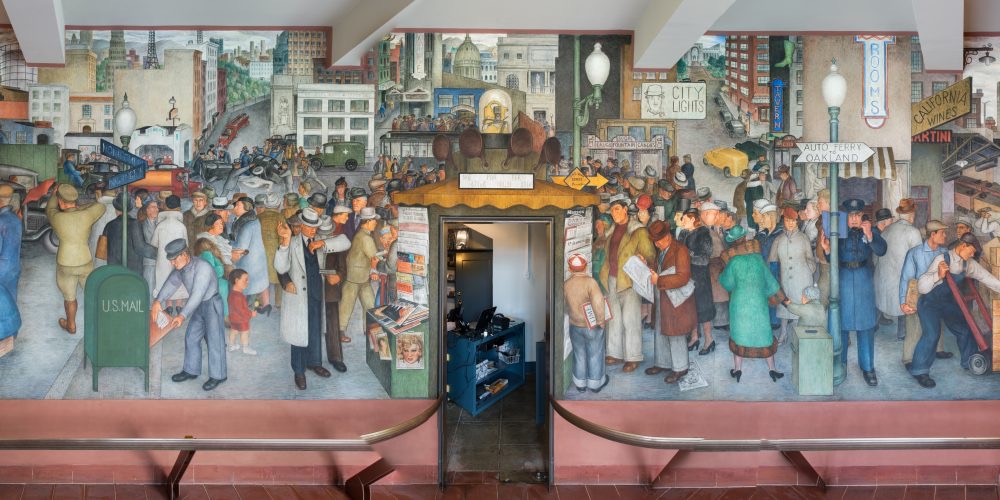
Coit Tower mural: Works Progress Administration, Telegraph Hill, San Francisco, California
Painters: Maxine Albro, Victor Arnautoff, Jane Berlandina, Ray Bertrand, Ray Boynton, Ralph Chesse, Rinaldo Cuneo, Ben Cunningham, Mallette Dean, Parker Hall, Edith Hamlin, George Harris, William Hesthal, John Langley Howard, Lucien Labaudt, Gordon Langdon, Jose Moya Del Pino, Otis Oldfield, Frederick Olmsted Jr., Ralph Stackpole, Suzanne Scheuer, Edward Terada, Frede Vidar, Clifford Wight and Bernard Zakheim. (1934)
"Light winds no clocks."
I first came to San Francisco seeking my future. I didn't find it there. Instead, I discovered a surprisingly immature city, one more suburban-seeming than New York City, one striving more than succeeding to seem European. It was impressively large and overwhelming. I couldn’t quite imagine myself unfolding there. I came home feeling like I'd been somewhere: Stanyon Street and Other Sorrows, Potrero Hill above the fog, the Golden Gate.
Rather than being a city that never slept, it seemed like one sleeping in, its ass end beneath the Marin Headland seeming to protrude halfway to China.
Down_Time
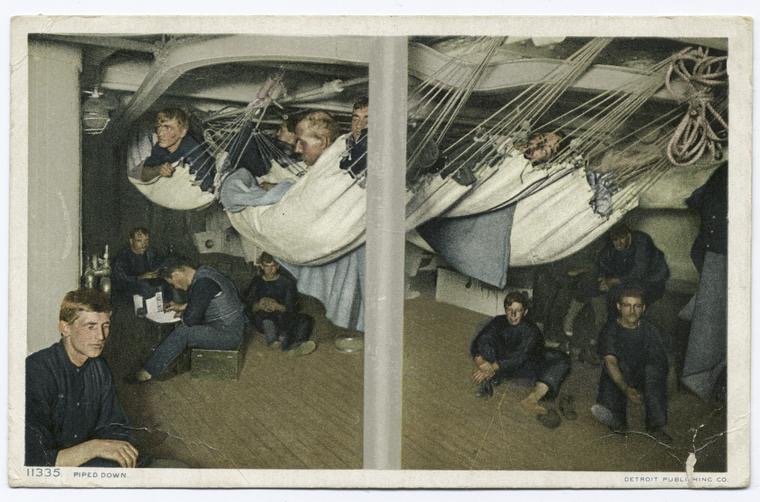
Unknown Artist (postcard): Piped Down (1907 - 1908)
"I've experienced worse."
The Muse proposes the getaways in this family. I'd just as soon stay home. After all the difficulties we overcame to secure this place, we might just as well stay put. She argues in favor of Down_Time, which seems a distraction and might well be one. I'll make no headway on completing any of those urgent chores from which I have diligently procrastinated all winter. My routine will have to go begging. In her defense, The Muse insists that I almost always end up enjoying my time away. "Things happen when you're out in the world," she proclaims, and I cannot counter. Still, I dread time away. I worry about my kittens' well-being even though we entrust them to the most loving and reliable sitter ever. They even like her!
I was not raised by a modern family.
Weekly Writing Summary For The Week Ending 2/08/2024
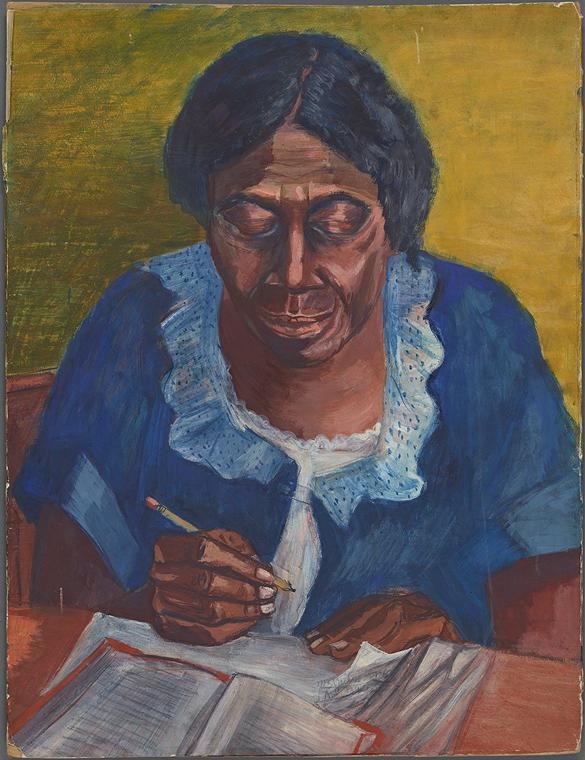
Morris Shulman: The Writing Lesson (1935-43)
Better Acknowledge The Contradictions
Poised up here in my West-facing office window overlooking The Center Of The Universe, I must confess that I often feel far removed from everything. I use my office for creating more than for revisiting. I struggle to recreate even fond memories here. My responsibility extends no further than forward, inexorably moving beyond the experienced and past the known. Decades of experiences have not left me knowing even myself, much less anyone or anything else. I continue searching, increasingly wondering if my purpose ever was to finally find anything. I seek without the explicit expectation that I will find anything, even me, waiting at the end of my effort. I continue creating my purpose, adapting to emerging circumstances. This world, this life, and even this iAlogue Series were not as initially proposed. I proposed to find a motive rather than to frame an achievable objective. Should I achieve what I intended, I will have failed in the final performance. The reward for diligently seeking might finally be the need for even more diligent seeking. My purpose might never have been to conclude but to better acknowledge the contradictions. Thank you for following along.
Vaxxer
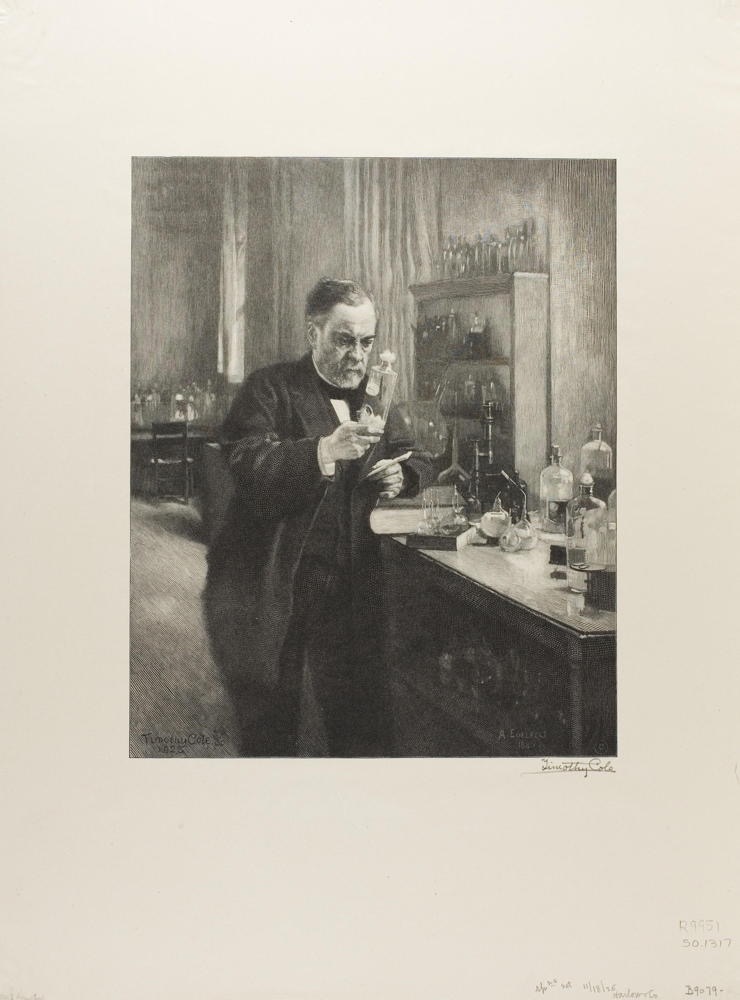
Timothy Cole: Louis Pasteur (1925)
"We are not nothing, but we're never entirely anything, either."
It wasn't until the height of the recent pandemic that the concept of being for or against vaccinations became a public question. There had always been certain conservatives who refused their shots, insisting they disrupted God's plan or bespoiled the arms of man, but most just rolled up their sleeve when asked. It had become a form of civic pride, a demonstration of fealty, and even evidence of sanity. Who in their right mind would expose themself, let alone their children, to some contagion if the means existed to avoid it? I always thought of the issue in black-and-white terms until antivaxxers emerged.
Then came stories of measles parties, where self-proclaimed rational parents would take their kids to mingle with some who were exhibiting symptoms of the most contagious disease around.
Grumps
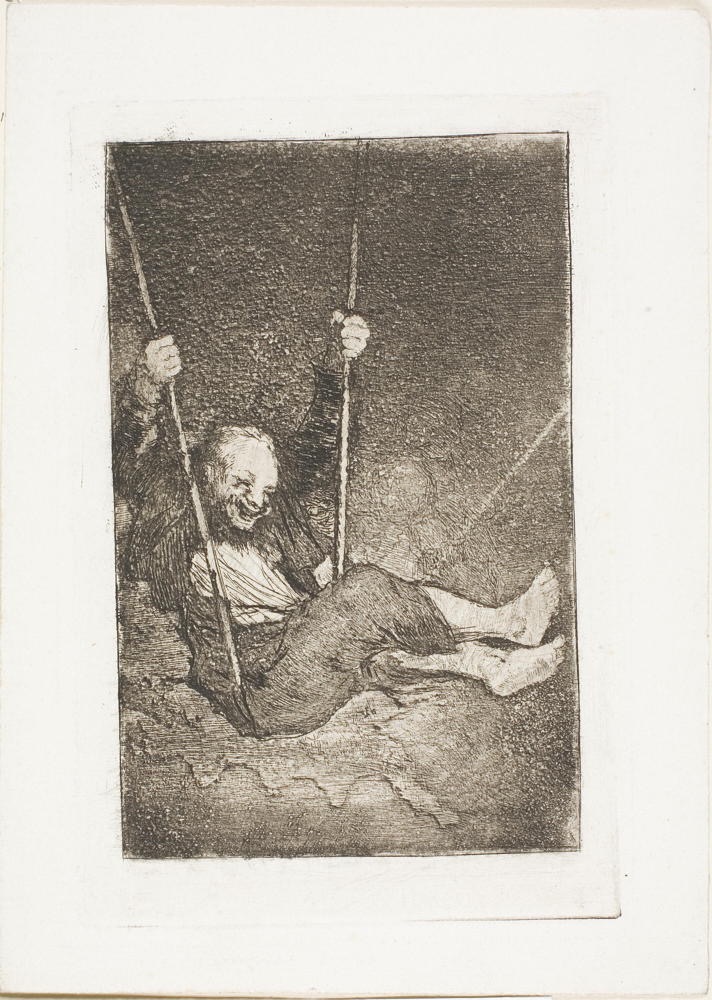
Francisco José de Goya y Lucientes:
Old man on a swing (1825/27)
" … You'll get grumpy, too."
I was not yet an old man when my grandson Roman was born. At sixty, my lifestyle had not appreciably changed in twenty years. Some enjoyed extended adolescence, while I extended my Middle Ages. Oh, I'd seen plenty of changes—two divorces and two marriages—over those twenty years, the heights of success and the depths of failure. I wouldn't want to suggest that my life hadn't been just as much a roller coaster as yours, but still, I had enjoyed good health, if not significant wealth, and great, if not necessarily sustaining success. I had managed to greet sixty with most of my optimism intact, and it was with pride as well as joy that I welcomed my grandson into this world. I introduced myself to him as "Grumps," his grumpy grandpa, a joke, intending irony. As everyone employing irony learns, irony eventually turns on its users. I grew Grumpier each year as my old age finally started overtaking me.
I was not on hand when he was born.
Training

Totoya Hokkei: Trained Monkey Performing with Jingle and Gohei (1824)
" … many had been successfully entrained …"
I might be untrainable. I know something about training because I worked as a trainer for many years. Those who participated in the workshops I facilitated insisted that I was pretty good at training, too. I didn't often disclose my secret, that I steadfastly refused to train anybody, if only because I firmly believed that my "students" were much better positioned to train themselves. I'd give them permission and assign the odd exercise, but these most often served as useful distractions to direct attention away while the actual learning occurred elsewhere. My techniques would have probably proven to be lousy ways to train airline pilots, but I was never Training airline pilots. The usual cram and recall schtick couldn't help anyone learn what I was teaching, for I traded in life skills rather than theories, the knowledge that resides more in muscles than memories.
I believe that most knowledge resides somewhere other than the head and that our most significant difficulty lies in our unshakeable belief that our brains are in charge.
Lyricist
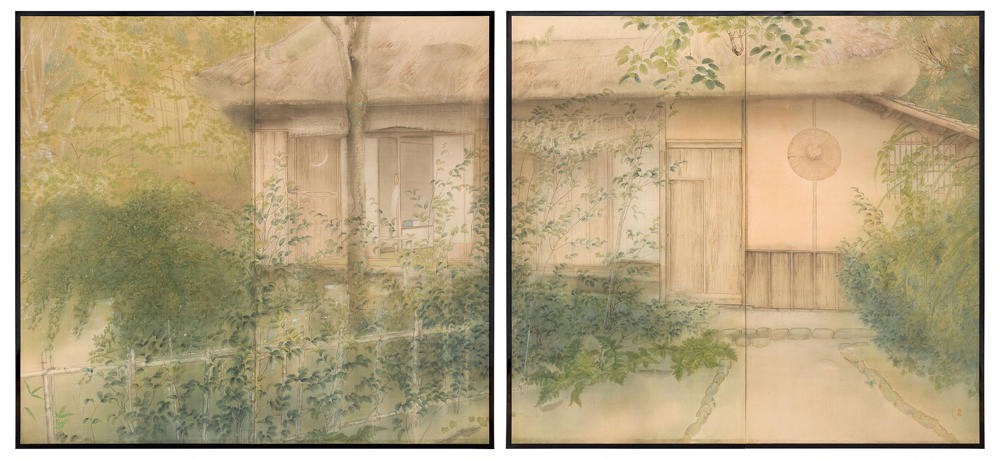
Hatta Kōyō 八田高容: Scholar’s Studio:
Rakushisha no aki [Autumn at the Rakushisha] (1925)
" … overlooking the center of the universe from the edge of the familiar abyss."
Every morning, I ask myself what kind of writer I am. My usual response might surprise you as much as it surprises me. You see, I do not consider myself much of an essayist or story writer. You might have noticed that my writing style seems challenging to categorize. My stories do not seem precisely like stories. They're more vignettes, glimpses rather than fully fledged. Some seem complicated but rarely very long: three or four minutes. I think of them as songs and focus more on their rhythm than their contents when laying them down. I think of them as lyrics, for I was first and will, therefore, probably always remain a Lyricist. I almost exclusively write songs, though most still need music, or written and performed accompaniment, anyway. For me, they elicit their scores. I can hear their accompaniment in how I perform them and how I end up reading them to myself. Each story leans toward the lyrical.
Or, that's my self-image, anyway.
Acculturating
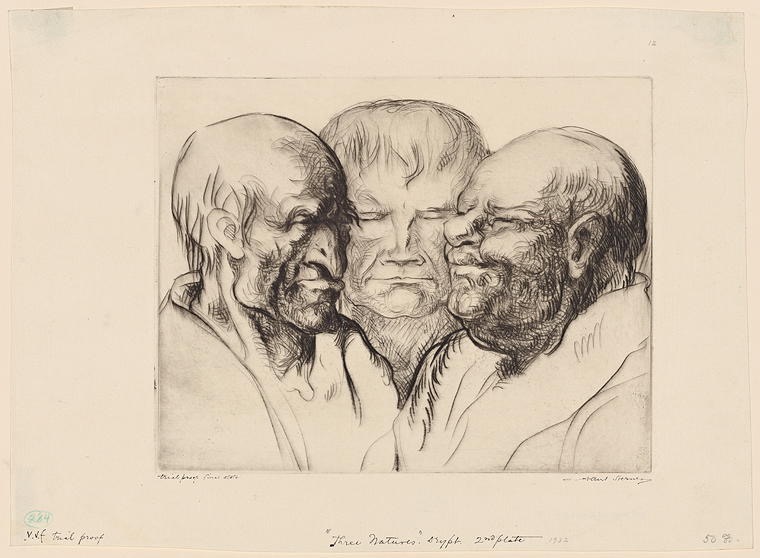
Albert Sterner:Three natures (1932)
“Nature is the realm of the unspeakable. It has no voice of its own, and nothing to say. We experience the unspeakability of nature as its utter indifference to human culture.”
— James P. Carse
Now that The Muse serves as a Port Commissioner, she gets called on to attend no end of local functions: fundraisers, friend raisers, and the odd assorted barn raising. I accompany, if only in my role as Arm Candy. I attend but never feel very at home there, for while I am from here, I never felt as though I was 'of' here, for the native culture always felt pretty alien to me. If I cannot feel at home in my own native culture, where, precisely, do I feel at home? It's an interesting question because I suppose I feel most at home as an alien. After decades of working far away from home and the dog years in exile, I feel I have no culture other than that of the typical hermit in transit. The Muse complains that I don't get out much, and her complaint seems accurate; it's just that I don't understand why my not getting out much qualifies as a complainable condition. If one has no culture, I suppose one tends to stay close to home, where the differences likely seem less glaring and where one can most conveniently associate with one's own kind.
As it is, I can hardly go out in public without noticing what certainly seems like some odd anomaly to me but probably not to anybody truly 'of' this culture.
Disappearing
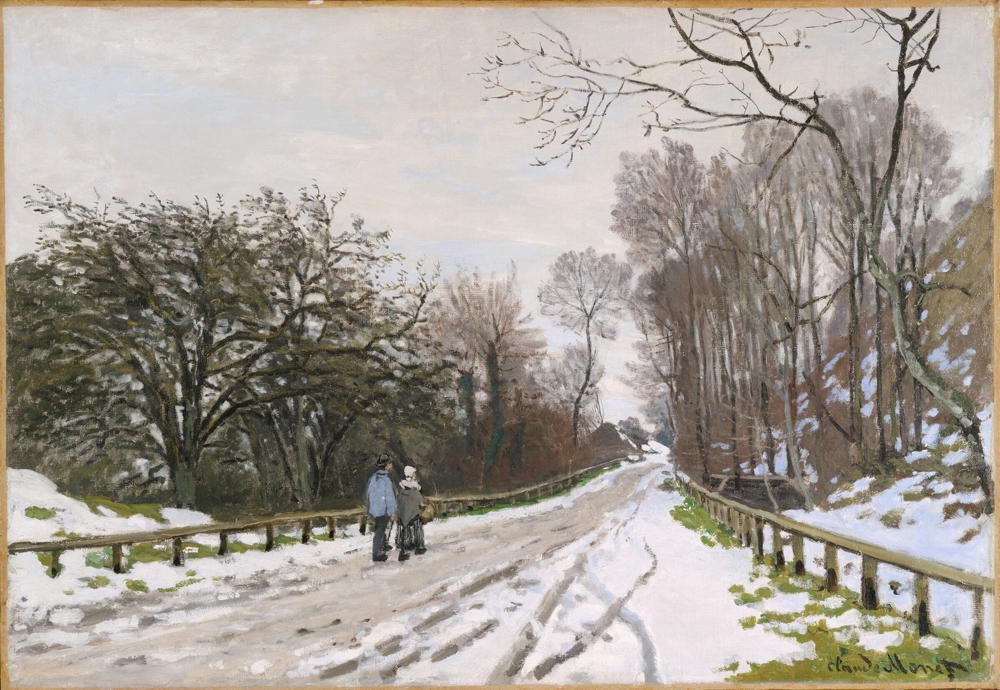
Claude Monet: Road toward the Farm Saint-Siméon, Honfleur (1867)
" … my world ultimately most skilled at Disappearing on me."
I write this iAlogue Story for anyone who ever lost their heart pursuing love. I mean, I mostly write this story for myself. I've lost more than my heart chasing love. I've also lost my mind pursuing reason and myself while seeking to find myself. Disappearing seems the common outcome of any attempted manifestation, for how could I have possibly known how to go about acquiring what I'd never had, never known? My plans unavoidably suffer from naive notions of both outcomes and necessary actions. I generally passionately head off in some wrong direction, thinking I understand which direction to head. Later, I might come to understand that I never understood. The Gods will have been cruel or kind by then, the single common outcome being the Disappearing.
I do not get to go back home again if only because home no longer exists by then.
Weekly Writing Summary For The Week Ending 2/01/2024
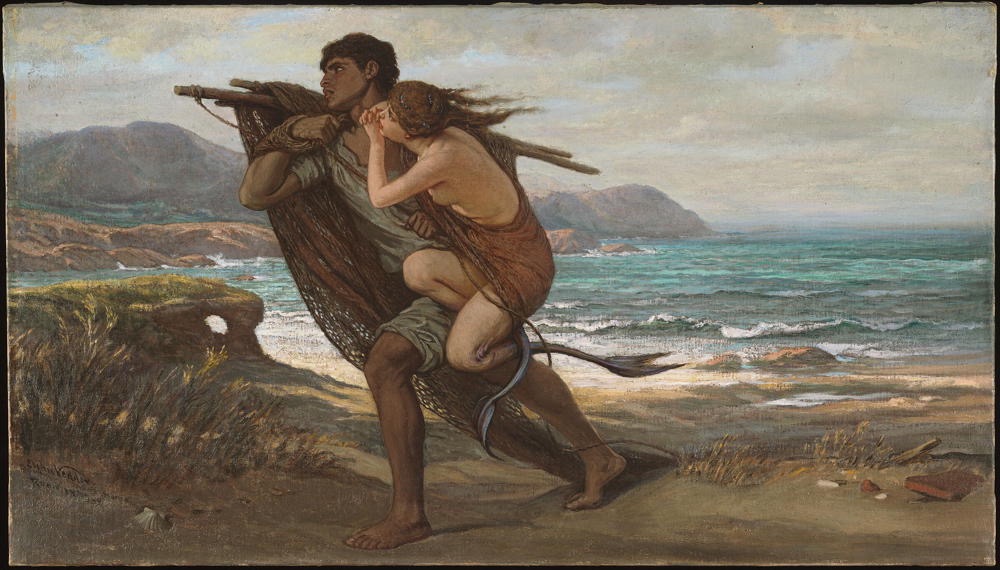
Elihu Vedder: Fisherman and Mermaid (1888-1889)
Unaccustomed To So Much Drama
As I was fixing my coffee this morning, a Neighbor cat, Tux, zoomed through the kitchen out of the basement. He’s always nervous when The Muse or I spot him on one of his trespasses. He’s a nice one, well-behaved, and more talented than our cats, neither of which has yet figured out how to use their cat flap door in that back second-floor window. Tux must have watched them hopping onto the deck superstructure where they can walk up the kitchen roof to meow at their flap door for The Muse or I to let them in. We’ve tried everything but have failed to teach them self-reliance. They crouch by the flap, crying for the help we rush to provide, making sure they leave outside that bird they’re holding. Had they learned to operate that door, the upstairs hall would be feathered sometimes. Tux clamored back upstairs and noisily let himself out that flap window while Molly, distracted from her breakfast, followed his progress by staring at the ceiling. Once she heard Tux landing on the deck, she was off outside for her morning’s adventures. Max, upstairs napping, was none the wiser. I took my coffee upstairs to finish creating my Weekly Writing Summary, unaccustomed to so much drama so early in the morning. Life continues in considerable earnestness, even in Heidi’s absence.
FebYouWary
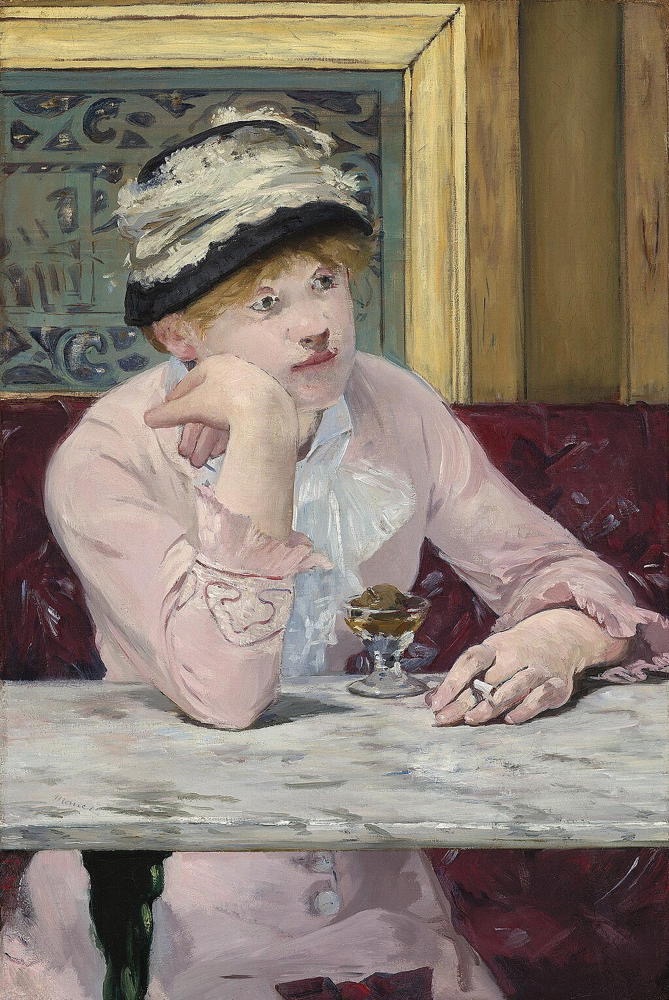
Edouard Manet - "La Prune" [Plum Brandy] (1877)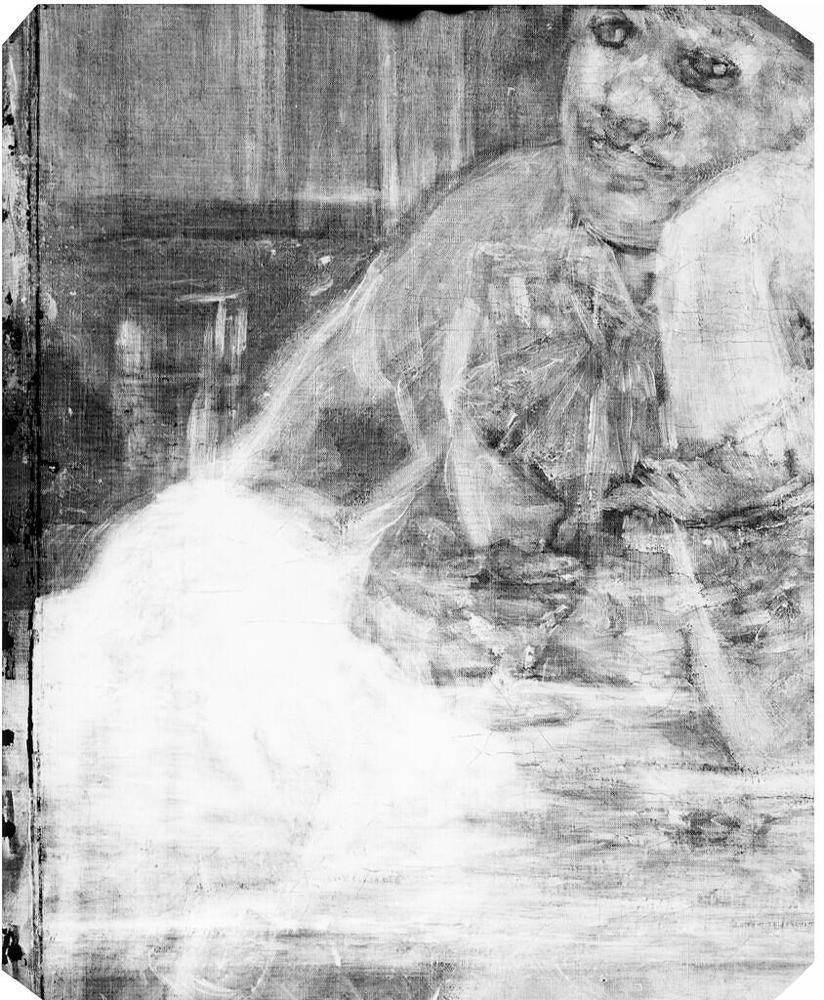
Edouard Manet: "La Prune" [Plum Brandy] photograph, x-radiograph (1948)
" … clearly never really intended to understand anything."
My daughter Heidi was born on April Fool's Day, though she was never anybody's fool. Her birth transformed that day from one of pranks into one of deeper understanding. Foolishness runs no deeper than skin; underneath, things get serious. My daughter Heidi died on Groundhog's Day in February, the first month of Spring at this latitude, the month I always relied on to deliver hope after an exhausting Winter. Her death transformed February into FebYouWary for me, a time I approach hesitantly now, dreading its arrival. I do not dread Spring's arrival, just the Groundhog's Day re-reminder that Heidi's gone forever. I never understood Infinite until my darling daughter disappeared there. My world seems hollow without her here, trapped within the finite with me. She's free. I grieve.
February belongs to that class of words that have no proper pronunciation.


